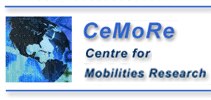

22 January 2014, Seminar, LUMS, LT4 14.00-19.00
23 January 2014, Workshop, InfoLab21 c60 b/c, 9.30-13.00
Home
Data can be ‘lovely data’ (McCandless 2010) – but what makes it lovely? Or who? This workshop explores examples of community and neighbourhood information practices, which actively seek to make data useful for communities. Analysis will identify practices, opportunities and challenges of mobilising data for broader (e.g. social, economic, political, aesthetic, scientific as well as risk and crisis management) aims.
Data – much of it generated as part of everyday living by all but the most marginalised people – brings ambiguous opportunities/challenges: On the one hand, ‘big data is the new oil’, fuelling global economic recovery (McKinsey Global Institute 2011). On the other, the amount of data, coupled with growing capabilities for agile processing, deep analytics, data-driven, proactive decision-making, and preventive approaches to health, risk management, law enforcement and security, also worry people. Albeit often unnoticed, data can constitute
a near complete map of private life: whom everyone talks to (by e-mail and phone), where everyone goes (mobile phone location co-ordinates), and what everyone reads online (websites browsed).
(Caspar Bowden, former Privacy Adviser to Microsoft, in Rauhofer, 2006:323)
In 2012 72% of European citizens were concerned that personal data may be shared without their permission or misused (Reding 2012). Recent disclosures about American and European surveillance programmes have stoked these anxieties, and political and economic operators fear that privacy worries may ‘discourage [citizens] from giving out their data … from buying goods and services online’ (ibid). This has prompted a thoroughgoing review of European data protection regulation and some data controllers now seek a ‘Data Dialogue’ (Demos 2012).
At the same time, radical and inventive community projects are arising at grassroots, with people using and making new kinds of data in new ways, or making corporate or public data collection, processing and uses visible for critical engagement. These projects encourage crowdsourcing and collective intelligence for citizen science (Hemment, Ellis, & Wynne, 2011), to mobilize people and resources during crises (Meier 2012, Starbird & Palen 2011), participatory art and sousveillance (Southern 2012, Clement & Potter 2008, Gray 2012).
With reference to concrete examples, this workshop will also explore how these issues change our relationship as researchers - and participants - to data. With data now actively mined for commercial purposes, how does this reconfigure researchers - as analysts, ethnographers or critics? We bring together researchers who are exploring how community information practices might engender more "radically careful and carefully radical" (Latour2008) big data production, analysisand use in a connected world.
Tel: +44 (0) 1524 592680 Fax: +44 (0) 1524 594256 E-mail: Pennie Drinkall


